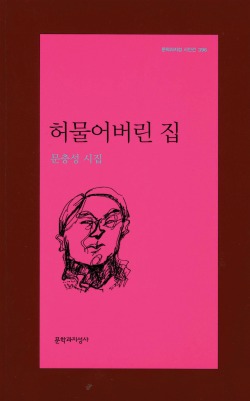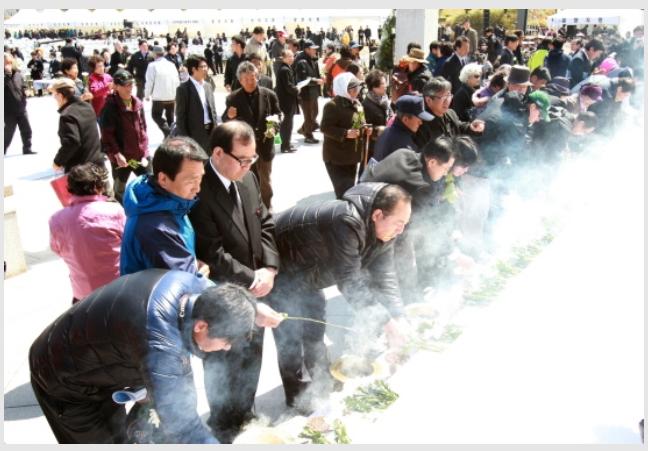|
| |
 |
|
| ▲ Moon Choong-sung explaining his life and work in a Jeju City Coffee shop. Photo by Darren Southcott |
It was at the 4.3 Massacre 65th Memorial Ceremony that I first heard the work of Jeju poet Moon Choongsung. At the end of the ceremony, before wreaths were laid, his poem “The Whole Island” was read. The last verse ran:
“What is it?
Where was the freedom?
The whole island was death.
The whole island.”
Having followed the politicized dignitaries’ speeches, the poem provided a moment of introspection for the gathered mourners. For Moon, such reflection - leading to reconciliation - are essential before Jeju’s history - and his - is lost forever. In the preface to his anthology, “Heomuleobeolin Jip,” he moots with melancholy:
“I dream of that final voyage, setting out for the unknown of that nostalgia, the nostalgia of that unknown.”
Moon is now 74 years old, living in Jeju CIty. He retired five years ago after spending 15 years at Jeju Ilbo and another 20 years as a professor at Jeju National University; he now holds an honorary position as Professor Emeritus. His voyage began back in middle school, when he experienced something that would lead him down a path that he is still walking to this day. Few have dealt with such ordeals.
“I was in the fourth grade of middle school when 4.3 happened and then the Korean War followed that - my whole childhood was war,” he said.
The 4.3 Massacre was a conflict on Jeju Island which claimed between 15,000 and 60,000 lives. A third of islanders were killed or made refugees under a policy of extermination by the Korean military as Jeju was declared a “Red Island” by Seoul and Washington. Families were torn apart in the ideological conflict - any human lying outside of a thin coastal strip was declared a communist - and killable.
The period of conflict led to some benefits for the island, which by the time of the Korean War had become an island of relative peace, attracting refugees from the mainland.
“Around this time people were fleeing to Jeju and they brought books with them - I started reading detective novels, such as Sherlock Holmes and others,” he said. This further grew the storytelling seed that had been planted by listening to Jeju myths such as Seolmundae Halmang on his grandparents’ knees.
While for some the war is long over, for Moon and other survivors the war is as present as ever, festering within communal and familial divisions that linger to this day. Ceremonial acts of reconciliation are no substitute for the real thing. In reference to the very ceremony at which I first heard his work, Moon says this in “4.3 Song:”
| |
 |
|
| ▲ Moon's work, Heomuleobeolin Jip. |
“Even yet it’s not over.
It will never be over.
Just once a year you go, up that hill.
All you people who gather,
you just sing of forgiveness, reconciliation, togetherness and peace.
Your tears have just turned from red to white.”
The red of pain, hatred and hurt, has become empty and shallow - not a whiteness of purity, but of vacancy. The poem was written to complement “The Whole Island:”
“In my anthology I include “4.3 Song” and “The Whole Island.” The first deals with the legacy of 4.3 in the present and the latter reflects on the past. I wanted to do this because we are still living 4.3 now - it is not finished,” said Moon.
Moon, in a style not used in Korean tradition, wrote 4.3 Song as a sonnet. The first two stanzas of four lines are followed by two stanzas of three, representing 4.3 in its very structure. In desperation he urges, “What are you doing? Stop fighting like enemies.” He continued:
“It is even evident in the reaction to “The Whole Island” that was read at the 4.3 ceremony. I use the term “san-pok-do-deul” (mountain rebels) - it is a term that was naturally used at the time - but people were angered by it, saying it was offensive. I was writing poetry, not making a political statement.”
Language and its use is something close to Moon’s heart - all of his work is written in Jeju dialect. It is something that clearly makes him who he is. He reads again from the preface:
“Jeju language (true Jeju language) is disappearing, Jeju people, too, are disappearing.”
Mun says the Jeju language is the the receptacle of Jeju’s soul. He quotes a French saying, his university major.
“The French people say, ‘who are the French people? They who use the French language are the French people,” they say. For me it is the same: the people who use the Jeju language are the Jeju people,” said Mun. “Are you a true Jeju person?”
I say it reminds me of a people who share with Jeju a history of cultural domination - the Cornish - who say language is intrinsic to nationhood and identity. A 17th century Cornish poem presciently warns:
“Never did good come of a tongue too long. But a man without a tongue shall lose his land.”
Moon says he goes further than this.
“I put the Jeju language even before the people, as it is the very soul of the Jeju people. Without the Jeju language there is no Jeju people. Jeju’s history must be told in the Jeju language before it disappears,” he said.
| |
 |
|
| ▲ Mourners at the 4.3 memorial service in 2013. Photo courtesy Jeju Special Self-Governing Province |
Moon’s connection to the language is deep and he remembers life as a student when he was forced to speak standard Korean in school while speaking the vernacular at home, constructing a division between authority and the state, and the language of the home, farm and family. This intensified after 4.3.
“After 4.3 if I went to Seoul people would call me a “red” and naturally Jeju people felt shame using the language. Jeju people have been blamed throughout history by the mainland and we still carry this with us,” he said.
Returning again to Jeju’s dark past, Moon sees Jeju’s victimhood as a recurrent theme in the face of hegemonic forces from near and far. “When I was young, Jeju was known as “the island of tears and sighs” due to its history of invasion and conquest, from an independent Tamna, to Mongol colonization, to its use as an exile island in the Joseon era, to Japanese occupation and then 4.3,” he said.
Moon is cheerful and softly spoken, whose quietness belies his reflective nature - which the island provides ample opportunity for. The glossy images of a holiday-maker’s paradise provoke a wry smile from the artist.
“It is interesting for me that people come here and see Seongsan Ilchulbong or haenyeo and see beauty and something wonderful. Actually these things represent the hardship and pain of Jeju,” he said. “When I see haenyeo I see the fight for life and when I hear their songs I recall not romance but hardship,” he said.
For Moon, the beauty of the landscape, now famed globally, is something that hides this tragic story of Jeju’s past.
“Jeju has another name that has come down to us: the island of divine punishment.”
|






















